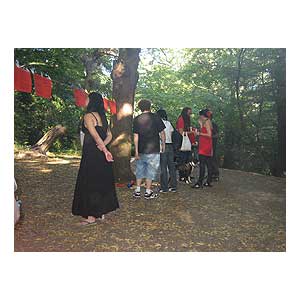 |
||
| urban wildlife | |
| 400 years and still waiting HISTORY OF HABEAS CORPUS: The history of Habeas Corpus is ancient. Predominately of Anglo-Saxon common law origin. It precedes Magna Carta in 1215. Although the precise origin of Habeas Corpus is uncertain the practice surrounding the writ has evolved over time. Habeas Corpus has since the earliest times been employed to compel the appearance of a person who is in custody to be brought before a court. And while Habeas Corpus originally was the prerogative writ of the King and his courts, the passage of hundreds of years time has permitted it to evolve into a prerogative writ initiated by the person restrained, or someone acting in his or her interest rather than by the King or his courts. Magna Carta obliquely makes reference to Habeas Corpus through express reference to “the law of the land”. From Magna Carta the quote roughly is: “...no free man shall be taken or imprisoned or diseased or exiled or in any way destroyed except by the lawful judgment of their peers or by the law of the land.” The practice and right of Habeas Corpus was settled practice and law at the time of Magna Carta of 1215 and was thus a fundamental part of the unwritten common “law of the land” as was expressly recognised by Magna Carta. |
|
    |
|
| HABEAS CORPUS (Latin: You (shall) have the body[1]) The writ of habeas corpus has historically been an important instrument for the safeguarding of individual freedom against arbitrary state action. or an individual judge for a writ of habeas corpus. The right to petition for a writ of habeas corpus has long been celebrated as the most efficient safeguard of the liberty of the subject. The British jurist Albert Venn Dicey wrote that the Habeas Corpus Acts "declare no principle and define no rights, but they are for practical purposes worth a hundred constitutional articles guaranteeing individual liberty." However, in most countries, the procedure of habeas corpus can be suspended in when a state declares a time of national emergency. Since the 18th century the writ has also been used in cases of unlawful detention by private individuals, most famously in Somersett's Case (1771), where the black slave Somersett was ordered to be freed, the famous words being quoted (or misquoted, see Somersett's Case). The air of England has long been too pure for a slave, and every man is free who breathes it. The arguments thus focused on legal details rather than humanitarian principles. When the two lawyers for Charles Stuart put their case, they argued that property was paramount and that it would be dangerous to free all the black people in England Lord Mansfield, having heard both sides of the argument, retired to make his decision, and reserved judgement for over a month. Finally, on 22 June 1772 he gave his judgement, which concluded:[4] ...The state of slavery is of such a nature, that it is incapable of being introduced on any reasons, moral or political; but only positive law, which preserves its force long after the reasons, occasion, and time itself from whence it was created, is erased from memory: it's so odious, that nothing can be suffered to support it, but positive law. Whatever inconveniences, therefore, may follow from a decision, I cannot say this case is allowed or approved by the law of England; and therefore the black must be discharged. Somersett was freed, and his supporters, who included both black and white Londoners, immediately celebrated a great victory. Chief Justice Holt's judgement in Smith v. Brown (1702) 2 Salk 666, where he is reported to have said: "as soon as a negro comes to England he is free; one may be a villein in England, but not a slave." |
|
  |
|